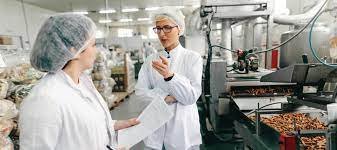
Introduction: In the intricate landscape of the food processing industry, ensuring quality, safety, and compliance is paramount. Internal auditors play a crucial role in upholding these standards by conducting thorough assessments, identifying risks, and implementing robust control measures. This article explores the indispensable contribution of internal auditors in the realm of food processing, highlighting their responsibilities, challenges, and the value they bring to the table.
The Role of Internal Auditors in Food Processing: Internal auditors in the food processing sector are tasked with evaluating and enhancing the effectiveness of internal controls, risk management practices, and compliance with regulatory requirements. Their responsibilities encompass a wide range of areas, including:
- Compliance Assessment: Internal auditors meticulously examine whether the organization adheres to applicable laws, regulations, and industry standards governing food safety, labeling, packaging, and distribution. They ensure that production processes align with regulatory requirements such as Good Manufacturing Practices (GMP), Hazard Analysis and Critical Control Points (HACCP), and Food Safety Modernization Act (FSMA) in the United States.
- Quality Assurance: Maintaining product quality is imperative in the food processing industry to safeguard consumer health and satisfaction. Internal auditors assess the effectiveness of quality management systems, inspect production facilities, and review product specifications to identify areas for improvement and ensure consistency in quality standards.
- Risk Identification and Mitigation: By conducting risk assessments, internal auditors identify potential hazards and vulnerabilities in the supply chain, production processes, and distribution channels. They evaluate the likelihood and impact of risks such as contamination, supply chain disruptions, and regulatory non-compliance, and recommend measures to mitigate these risks proactively.
- Process Improvement: Internal auditors collaborate with cross-functional teams to review and optimize operational processes. Through process mapping, data analysis, and performance metrics, they identify inefficiencies, bottlenecks, and opportunities for streamlining operations, enhancing productivity, and reducing waste.
- Supplier Audits: Ensuring the reliability and integrity of suppliers is crucial for maintaining the safety and quality of raw materials and ingredients. Internal auditors conduct supplier audits to assess their compliance with food safety standards, ethical practices, and contractual requirements. They establish criteria for supplier selection, monitor performance, and address any deviations or concerns promptly.
Challenges Faced by Internal Auditors in Food Processing: Despite the importance of their role, internal auditors in the food processing industry encounter several challenges that can hinder their effectiveness:
- Evolving Regulatory Landscape: The regulatory environment governing the food industry is constantly evolving, with new laws, standards, and compliance requirements emerging regularly. Keeping abreast of these changes and ensuring ongoing compliance can be demanding for internal auditors.
- Complex Supply Chains: The global nature of food supply chains introduces complexities and risks associated with sourcing raw materials from multiple suppliers across various regions. Internal auditors must navigate these complexities to ensure the integrity and safety of ingredients throughout the supply chain.
- Data Management and Analysis: Managing and analyzing vast amounts of data from production processes, quality control systems, and regulatory documentation can be overwhelming. Internal auditors require robust data management tools and analytical skills to extract meaningful insights and make informed decisions.
- Resource Constraints: Limited resources, including budgetary constraints and staffing shortages, can impede the effectiveness of internal audit functions in food processing companies. Adequate investment in training, technology, and staffing is essential to overcome these challenges.
The Value of Internal Auditors in Food Processing: Despite the challenges they face, internal auditors play a pivotal role in ensuring the safety, quality, and compliance of food processing operations. Their contributions offer several tangible benefits to organizations:
- Risk Reduction: By identifying and mitigating risks proactively, internal auditors help prevent food safety incidents, regulatory violations, and reputational damage. This proactive approach minimizes the likelihood of costly recalls, lawsuits, and brand erosion.
- Enhanced Compliance: Internal auditors ensure that food processing companies adhere to applicable laws, regulations, and industry standards, thereby reducing the risk of non-compliance penalties and regulatory sanctions. Compliance with standards such as GMP, HACCP, and FSMA enhances consumer trust and confidence in the brand.
- Operational Efficiency: Through process improvements and optimization initiatives, internal auditors streamline operations, reduce waste, and enhance productivity. These efficiency gains translate into cost savings, higher profitability, and competitive advantages in the marketplace.
- Continuous Improvement: Internal auditors foster a culture of continuous improvement by conducting regular audits, monitoring performance metrics, and implementing corrective actions. This iterative process drives ongoing enhancements in quality, safety, and operational excellence.

Conclusion: Internal auditors play a vital role in safeguarding the integrity, safety, and compliance of food processing operations. By conducting comprehensive assessments, identifying risks, and implementing robust control measures, they contribute to the overall success and sustainability of food processing companies. Despite the challenges they face, internal auditors remain indispensable assets, driving continuous improvement and ensuring consumer confidence in the food products they produce.
